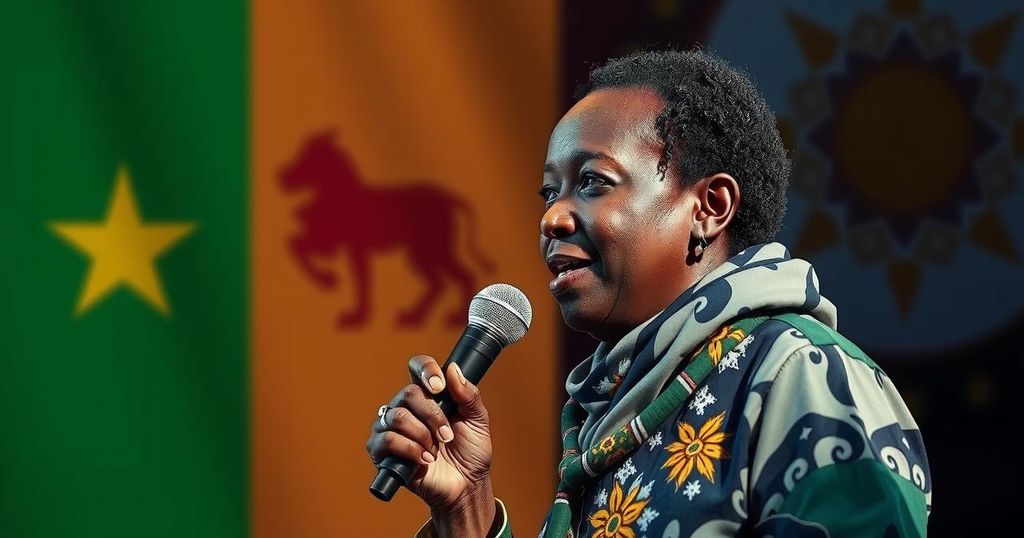World news
2024 ELECTIONS, AFRICA, AFRICAN NATIONAL CONGRESS, BRITAIN, DEMOCRACY, ELECTIONS, ELECTORAL PROCESS, GOVERNANCE, GOVERNMENT, INDEPENDENT PATRIOTS FOR CHANGE, IPC, ITULA, NANDI - NDAITWAH, NET, NEW INDEPENDENT PATRIOTS FOR CHANGE, NEWCASTLE, SOUTH AFRICA, SOUTHERN AFRICA, SWAPO
Daniel O'Connor
0 Comments
Netumbo Nandi-Ndaitwah Becomes Namibia’s First Female President Amid Controversy
Namibia has elected its first female president, Netumbo Nandi-Ndaitwah, who won 57% of the vote, amidst claims of electoral irregularities by opposition parties. Nandi-Ndaitwah, a former vice president and part of the independence movement, has vowed to lead the nation toward peace and stability. The election raised concerns over the integrity of the voting process, compounded by a decline in Swapo’s parliamentary support.
Namibia has made history by electing its first female president, Netumbo Nandi-Ndaitwah, in a recent presidential election that has been shadowed by controversy. The official results indicate that Nandi-Ndaitwah, who served as the vice president prior to this election, secured 57% of the votes, thus continuing the ruling Swapo party’s dominance, established since the nation’s independence in 1990. Upon the announcement of the results, she stated, “The Namibian nation has voted for peace and stability.” Nandi-Ndaitwah has a long history of political involvement, having been part of Namibia’s independence movement in the 1970s, and her election follows the death of President Hage Geingob while in office.
However, the election has not been without its challenges. Opposition parties have raised concerns regarding the integrity of the voting process, citing issues such as a shortage of ballot papers which led to an extension of the voting period until Saturday. This extension has been deemed illegal by opposition factions, who intend to contest the election results in court. The main opposition candidate, Panduleni Itula, garnered 25.5% of the vote, a decline from his 29% share in the previous elections. Nandi-Ndaitwah’s performance exceeded that of her party as well, which faced a decline in parliamentary votes, receiving only 53%, down from 65% five years prior.
Nandi-Ndaitwah is widely recognized as a capable leader, noted for her diplomatic experience and unblemished reputation amidst allegations of corruption that have affected some of her party colleagues. Her election marks a significant departure from recent trends in southern Africa, where liberation movements have faced severe electoral challenges from younger voters seeking change, as evidenced by the electoral losses of incumbent parties in neighboring countries. As Namibia moves forward under her leadership, this historic election may pave the way for further developments in the region’s political landscape.
The election of Netumbo Nandi-Ndaitwah as Namibia’s first female president represents a monumental shift in the country’s political history. Namibia has been governed by the Swapo party since gaining independence from apartheid South Africa in 1990, yet this election has been marred by disputes regarding the electoral process. The opposition has raised significant concerns about the credibility of the voting, highlighting systemic issues that have arisen in electoral administration. Furthermore, Nandi-Ndaitwah’s election reflects ongoing dynamics in southern Africa, where the public sentiment among younger voters is shifting, leading to increasing electoral competition for long-standing ruling parties.
In conclusion, the election of Netumbo Nandi-Ndaitwah as Namibia’s first female president signifies a pivotal moment in the history of the nation, although overshadowed by allegations of electoral irregularities. The Swapo party continues its long-standing rule, yet faces new challenges from opposition parties, highlighting a nuanced and evolving political climate. The outcome of the election may influence further shifts in governance and voter engagement within Namibia and the broader southern African context.
Original Source: www.theguardian.com




Post Comment